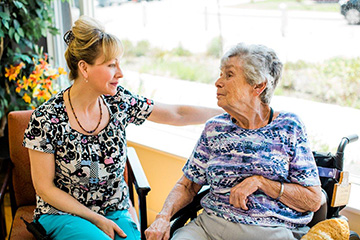News
Flu Prevention
Date: 2019-11-19
Visitors and staff can help lower the risk of influenza this flu season
Every winter brings a new flu season, when a contagious respiratory illness called influenza (“the flu”) makes the rounds. The very last thing that friends and family visiting St. Joseph’s Care Group (SJCG) sites want to do is bring a case of flu in with them because it can have devastating effects on people in hospitals and long-term care homes, especially people who are elderly or have compromised immune systems. Complications can include pneumonia, more medications and increased time in hospital. Each year in Canada, about 3,500 people die from the flu.
“We want friends and families to come and visit their loved ones in hospital and long-term care. That’s part of their comfort, support and well-being,” says Shannon Blake, Manager of Infection Prevention & Control at SJCG. “We want them to have that interaction, but in a safe way. There are definitely things visitors can do to help.”
Following some simple steps can help keep loved ones safe this flu season:
Reschedule if you’re not well
If you have a cough, cold symptoms or fever, please wait until you’re feeling well again before you come to visit, as those symptoms could also be a sign of influenza. Diarrhea or vomiting aren’t associated with the flu in adults, but rather with gastrointestinal viruses, and it’s best to stay home if you have those symptoms too.
Wash your hands
Wash your hands with soap and water for at least 15 seconds, or use an alcohol-based hand sanitizer, before entering or exiting a client’s room, before and after eating or helping someone else to eat, after using the bathroom, after coughing, sneezing or blowing your nose, and after touching surfaces like door handles and elevator buttons that are used by many people.
Stop the spread
Sneeze or cough into your upper arm, rather than your hands, and put all used tissues in the garbage right away. Rather than using a bathroom in a resident or client’s room when you’re visiting, Blake recommends using the public bathroom, to help minimize the unintentional spread of viruses.
Consider the flu shot
“Speak to your primary care provider about getting a flu shot,” says Blake. “You can be the carrier of the flu when you don’t have symptoms, and bring it to someone without knowing it. The shot minimizes your risk of being a carrier.” She adds if you’re infected with the flu, whether you have symptoms or not, you can “shed” the virus through coughing, sneezing or even talking, which can spread droplets carrying the flu virus to other people or surfaces. SJCG also makes the flu shot available to staff, as well as residents and clients who want it.
Read the signs and check our website
Pay attention to signs posted at entrances, at each floor or unit, or client rooms which can list symptoms or precautions currently in place, says Blake. “If you have any questions about the signs, definitely ask the nursing staff and they’ll be happy to provide information.” If another room is available, a client or resident who is ill may be moved there to reduce the risk of infection to a roommate. When there’s an outbreak of flu or another illness, SJCG provides updated information to clients and their families (www.sjcg.net), as well as the Thunder Bay District Health Unit’s Outbreak website.
“The benefits of practicing good flu hygiene are far-reaching,” notes Blake. “With just a few simple steps, we can help reduce the spread of flu this season.”
Check Before You Visit - To see a list of sites (including SJCG sites) with currently-occurring outbreak, visit Thunder Bay District Health Unit’s Outbreak.

